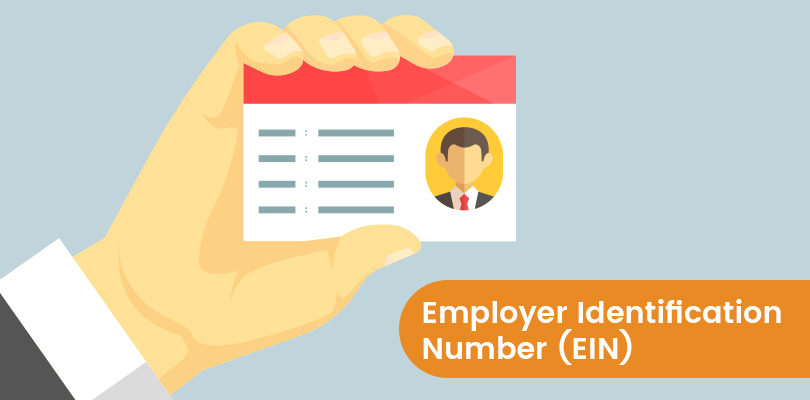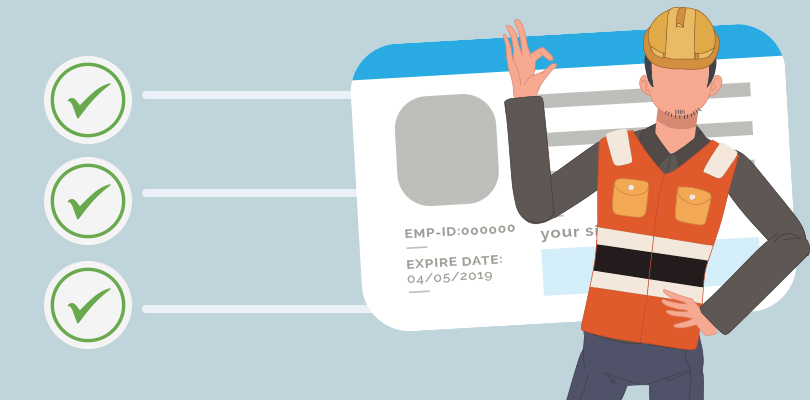7 Reasons You Should Consider an EIN as an Independent Contractor

If you’re the owner of your own business or perhaps looking to set up one, then you’ve learned about the Employee Identification Number (EIN). If you’ve searched for information on the best ways to begin a business, you might have seen that each blog and article advises you to apply for your EIN along with the appropriate license and insurance. This is considered necessary to start a successful business.
Kickstart a successful business with Field Promax.Sign Up Now.
This, however, may lead to some confusion. If you’re an independent contractor, do you even need an EIN?
The short answer is no. US tax law exempts you from obtaining an EIN if you do not employ people in your company. Still, it is essential to note that there are multiple advantages to an EIN as an independent contractor.
In this blog, we will tell you all about EIN, including FAQs like TIN vs. EIN, how to get an EIN, how long it takes to get an EIN, and, of course, how you may benefit from this as an individual contractor. Keep reading to find out more.
Table of Contents
What is an Employer Identification Number (EIN)?
The term employer identification number, commonly known as the EIN, is a unique identifier issued to taxable entities by the IRS. Employers usually use EINs (or Federal Tax ID Numbers) for reporting taxes. This has nine digits in it, which are written as XX-XXXXXXXX. The IRS often provides EINs to businesses directly, and this is done almost instantly.
Employer Identification Number is a number issued for identifying business entities in the USA, similar to how an SSN identifies individuals within the country. This is referred to as an Employer Identification Number (Ein) or federal tax identification number.
TIN vs. EIN: What’s the Main Difference?
When talking about tax-related documents, many people ask, “Is TIN the same as EIN?” These might confuse people, and some are wronged by not obtaining an EIN despite having a TIN for the same purposes. However, they are in no way alike, and each has its own purpose.
We have noted earlier that EIN is an abbreviation for the nine-digit tax ID of an employer. In most cases, the business for consideration encompasses a non-profit organization, state, estate of decedent, employer, corporation, limited liability partner, and other forms of business entities.
On the contrary, the abbreviation “TIN” stands for different types of tax ID’s. This number is to be used on one’s tax returns and other related documents. These rules play a critical role as they help in the enactment and regulation of revenue laws that govern the country on many occasions. Whether you are paying independent contractor fees, L1 Visa, OPT Visa, E2 Visa, or TN Visa fees, you need a TIN.
In simple terms, a TIN (Taxpayer Identification Number) encompasses all kinds of identification numbers used for reporting taxes. This includes:
- EIN: Employer identification number
- SSN: Social Security number
- ITIN: Individual taxpayer identification number
- ATIN: Adoption taxpayer identification number
- PTIN: Preparer taxpayer identification number
So, next time, if someone asks you, “Is TIN same as EIN?” tell them that an EIN is a type of TIN, whereas a TIN is a generic term for several types of taxpayer numbers, including EIN.

Who Needs an EIN?
You need an EIN if you have employees, operate as a corporation or partnership, file certain tax returns, or withhold taxes from income other than wages. Business entities must apply for an EIN by phone, online, fax, or mail before they can begin operations. All forms of businesses can apply for and be issued EINs, including:
- Limited liability companies (LLCs)
- Sole proprietorships
- Non-profit organizations (NPOs)
- Government agencies
- S corporations
- Partnerships
- Estates
- Trusts
The list above denotes entities that may apply for an EIN. This, however, doesn’t necessitate all of them having an EIN. Many entities can legally function without an EIN. But if you fulfill the following criteria, you must have an EIN to be able to conduct your business.
- Have employees
- Operate as a partnership or corporation
- File excise, employment, tobacco, alcohol, and firearms tax returns
- Have a Keogh plan
- Withhold taxes on income paid to non-resident aliens
- Involves with various types of organizations, including but not limited to estates, trusts, and non-profit organizations
Can Independent Contractors Get an EIN?
Although it may not be necessary, independent contractors can indeed apply for and get an EIN. According to the IRS, independent contractors are considered self-employed and are a type of sole proprietorship. Some sole proprietorships (like those with employees, for example) must get an EIN. For independent contractors, however, it’s optional.
Benefits of Getting an EIN as an Independent Contractor
Even if you aren’t obliged to have one, you might consider acquiring one. Possessing an EIN generally lets you isolate your financial affairs and lifestyle from your company in the USA. This is critical for simplifying bookkeeping and accounting as well as limiting responsibility in the event of a lawsuit. Sometimes, skipping out on an employment identification number now will cost you money and time later.
Here are some more benefits of having an EIN as an independent contractor:
You could be shocked to hear that obtaining an employee identification number is a useful tool for preventing identity fraud. An EIN is a number that distinguishes between personal and corporate money. You won’t have to give your actual SSN or Social Security number to customers or vendors if you have an employee identification number. You could instead supply your EIN.
By supplying your employer identification number, you may keep your SSN more secret, reducing the likelihood of a criminal acquiring it and allowing the use of your money.
You must fill out special documentation to tell the IRS if one does not have his/her employment identification number by the tax date and is expected to receive one. If one fails to do so, the IRS may reject your submission, and you may be subject to penalties for submitting late.
According to the Small Business Administration, an EIN is required to establish business credit. In some cases, you may get business credit cards with EIN only. Business credit is very similar to personal credit. Like personal credit reports, business credit reports take several factors into account to determine how financially responsible your business is. Much like your personal credit score, business credit scores are used when evaluating loan and credit card applications. In general, the better your business credit score is, the lower your interest rates will be.
As a small business owner, it’s not possible to do everything by yourself while building your company. You often have to rely on vendors, suppliers, and partnerships with other businesses to achieve your goals. Having an EIN makes such third parties more likely to work with you. These parties might want to check your business credit before signing up to work with you. Wholesale distributors often require an EIN check before they do business with a retailer. Having an EIN shows that you have a credible business and are a responsible person who will pay the vendor on time. Using an EIN is a fast, free, and easy way to help meet that standard. An EIN reinforces that you view yourself as an independent contractor and sole proprietor, demonstrating that you take your work seriously and add credibility.
You can speed up the process of applying for a business loan if you have an EIN. Most lenders don’t explicitly require one. As long as you have any necessary business permits or licenses and are legally qualified to do business, you can apply for the loan. The catch is that many lenders require applicants to have a business bank account with a certain number of deposits. This is to ensure that you have a place to receive the loan funds and make periodic loan payments. In addition, some lenders, including SBA lenders, check business credit when evaluating your loan application. This is where an EIN may help you significantly, for some lenders issue business credit cards with EIN only.

In the US, independent contractors have tax-deferred retirement savings options similar to those of employees participating in company plans. Two of the most common savings plans are individual 401(K)s and SEP-IRAs.
Individual 401(K)s offer many of the same benefits as a traditional 401(K) and allow self-employed workers to contribute up to $64,500 annually. In order to set up an individual 401(K), you must have an EIN. A SEP-IRA allows independent contractors to contribute up to 25% or $57,000, whichever is less, annually. Although you don’t legally need an EIN to open a SEP-IRA, most institutions will require one.
Having an EIN can be particularly helpful for starting a business if you’re a non-U.S. citizen without a Social Security number. Foreign nationals can apply for an EIN by contacting the IRS. Even before you get a Social Security number, you can apply for a startup business credit card with EIN only. This gives you some headway in launching your business and might even give you a competitive advantage if you need to move quickly.
Now that you have a fair idea of how an EIN may help you as an independent contractor, let’s find out the answers to the most frequently asked questions about obtaining an employee identification number.
How to Get an EIN?
Applying for an EIN costs nothing. Applications can be made by phone (for those who aren’t in the United States but will do business in the country), fax, mail, or online. The process is fairly easy and uncomplicated.
To get an EIN, you just need to fill out Form SS-4: Application for Employer Identification Number, which is available on the IRS website. The IRS requires the following information to be included on the application in order to issue an EIN, such as the name of the company’s principal officer, partner, trustor, owner, or any other title, along with their personal taxpayer identification number.
Some of the information that must be included on the form includes:
- The type of entity
- The reasons for applying (new business, change of organization, IRS withholding requirement compliance)
- The start or acquisition date
- The principal industry of business
To apply for an EIN online, a business must be located in the U.S. or U.S. territories. Once the online information is validated, an EIN is assigned immediately.
How Long Will It Take to Get an EIN?
One of the most frequently asked questions about EIN is how long does it take to get EIN number. When applying online, you can get an EIN immediately. An EIN application can be faxed to the IRS, though this mode of application may take up to two weeks. The IRS also accepts paper mail applications, though it quotes an expected turnaround time of four to five weeks.
How to Close Your EIN?
Once you are assigned an EIN, that identification number will forever be associated with you and your company. That EIN becomes permanently associated with that entity, and the IRS can technically never cancel an EIN.
An EIN is a critical part of required financial reporting. Even if an entity never files a return, the EIN is still associated with it. Once an EIN is issued, the identification number can be used at a later date if the entity needs it.
If you do receive an identification number but later decide the number was never needed, the IRS can close your associated business account. This is often the case for startup companies that never actually launch. A physical letter must be mailed indicating the legal name, business address, EIN, and reason for the account closure. The EIN will remain; only the IRS business account will be suspended.
What Happens If You Lose or Misplace Your EIN?
If you misplace your EIN, look for it on the notice sent to you by the IRS when your EIN was issued You can also try to recover it by contacting the financial institution where you do your day-to-day banking. You can also find it on your previous tax returns. If all else fails, contact the IRS’ Business & Specialty Tax Line at 1-800-829-4933. Make sure you have any identifying information on hand before you speak to an operator.
Whether you are a full-fledged business owner or an independent contractor, whether you have an EIN or not, one thing you must have to run your business smoothly is Field Promax.
So, sign up today!
Field Promax is the best field service management software that efficiently automates and streamlines your business. With this cutting-edge digital tool, you can take care of all your back-end tasks, including scheduling and dispatching, work order management, reporting, monitoring, estimating, time-tracking, billing, invoicing, and more. The result is more efficiency and transparency in your workflow, which enables you to increase productivity, provide a better customer experience, and establish yourself as a trusted independent contractor.
For more information contact Field Promax today.






